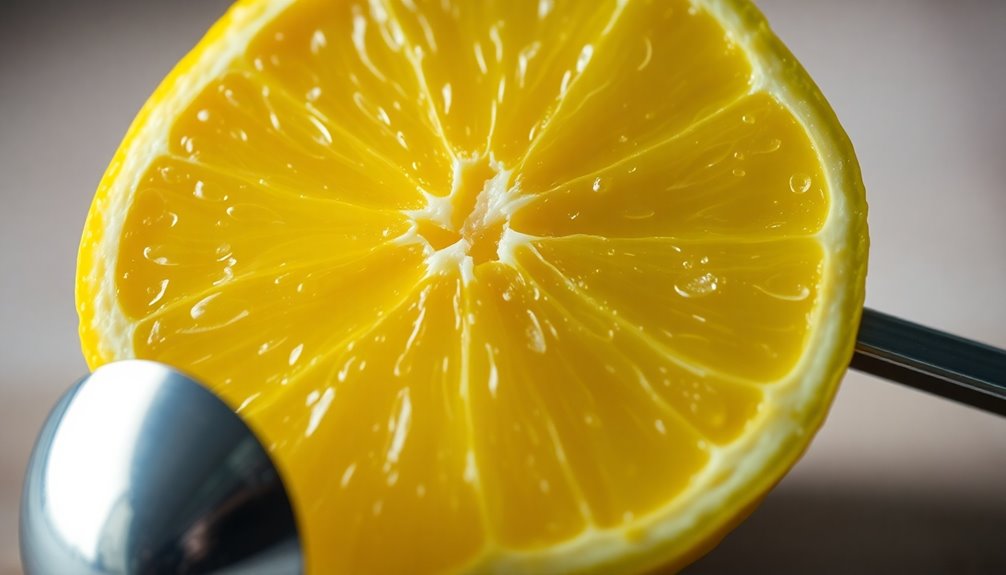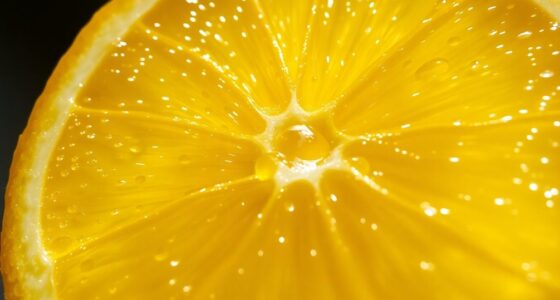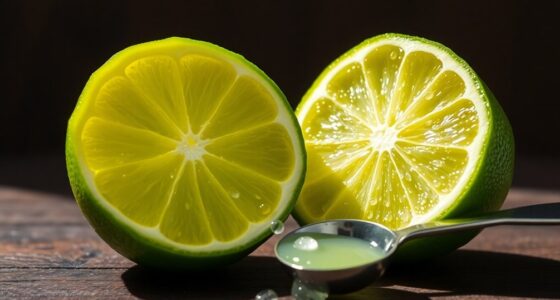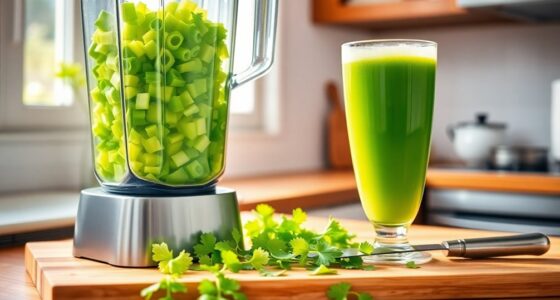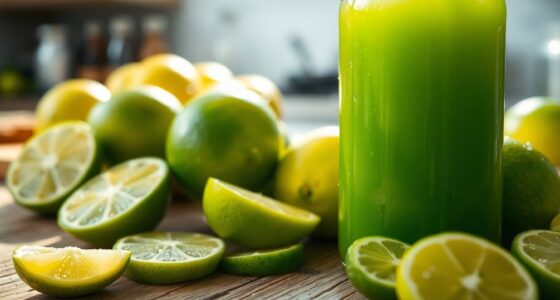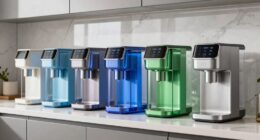A medium lemon usually yields about 1. 5 fluid ounces of juice, which translates to roughly 2 to 3 tablespoons. If you’re working with larger lemons, you might get up to 4 tablespoons. Remember, size and ripeness can affect juice yield, so ripe lemons are often juicier. To get the most juice, try rolling the lemon first or using a juicer. Stick around to discover tips on selecting and extracting the best juice from your lemons! When considering how much juice from one lemon you can extract, keep in mind that different varieties may vary in juiciness. For example, some types like Eureka or Lisbon lemons are known for their high juice content, while others may be less prolific. Additionally, if you’re unsure about the yield, always grab a few extra lemons to ensure you have enough for your recipe!
Key Takeaways
- A medium lemon typically yields about 1.5 fluid ounces of juice, equivalent to 2 to 3 tablespoons.
- Larger lemons can yield up to 4 tablespoons of juice, while smaller lemons may yield more relative to their size.
- The juiciness of a lemon is influenced by its ripeness; ripe lemons generally produce more juice.
- Rolling the lemon before cutting can help maximize juice extraction by breaking down inner membranes.
- Environmental factors and lemon size also play a role in overall juice yield.

Have you ever wondered how much juice you can squeeze out of a lemon? If you've ever tackled a recipe that calls for lemon juice, you might've found yourself asking how much juice is actually in one lemon. Let's break it down.
On average, a medium lemon contains about 1.5 fluid ounces of juice, which translates to roughly 2 to 3 tablespoons. If you're lucky enough to have a large lemon, you might squeeze out up to 4 tablespoons. But how does this compare to smaller lemons?
Interestingly, smaller lemons often yield more juice relative to their size. While they may look petite, these citrus fruits can surprise you with their juiciness. So, if you're using smaller lemons, you might find that you can extract just as much or even more juice than from their larger counterparts. The thickness of the rind plays a role here; larger lemons tend to have thicker rinds, which can mean less juice in the end.
Now, if you're in the kitchen and need a specific amount of juice for your recipe, knowing how to estimate the amount from your lemons is essential. For instance, if a recipe calls for about 3 tablespoons of lemon juice, you might need two medium lemons. This is because the yield can vary based on the size and ripeness of the lemons you have on hand. If you're aiming for a cup of lemon juice, prepare to use around 5 to 5.5 medium lemons.
It's also important to consider the ripeness of the lemons you're using. Ripe lemons are generally juicier, so if you're choosing between lemons at the store, go for the ones that feel slightly heavy for their size. This weight often indicates a higher juice content.
When you're ready to juice, roll the lemon on the countertop using your palm. This helps break down the inner membranes, making it easier to extract every last drop of juice.
After that, cut the lemon in half and use a juicer or your hands to squeeze out the juice. If you find that you're struggling to get enough juice, you can also microwave the lemon for a few seconds to warm it up slightly, which can help release even more juice.
Frequently Asked Questions
How Much Real Lemon Equals the Juice of One Lemon?
When you're looking to substitute real lemon juice, it's good to know that about 2 to 3 tablespoons usually equals the juice from one medium lemon.
If you're using bottled lemon juice, check the label for conversion rates, as brands can vary.
For the best flavor, you might want to stick to fresh juice when possible.
Just remember, the yield can differ based on the lemon's size and ripeness!
Can You Substitute Bottled Lemon Juice for Fresh Lemon Juice?
When you reach for that sunny bottle of lemon juice, remember it's like picking a painted flower instead of a fresh bloom.
You can substitute bottled lemon juice for fresh, but be aware it might lack the vibrant zing you crave.
Start with less than you think you need, as bottled juice can be a bit more intense.
For the best flavor, though, nothing beats the freshness of a real lemon.
How Much Lemon Juice Is Equivalent to One Lemon?
When it comes to measuring lemon juice, you'll find that the yield can vary quite a bit.
On average, a medium-sized lemon gives you about 3 tablespoons of juice. If you’re using larger lemons, you might get up to 1/4 cup. When considering recipes that require fresh lemon juice, it’s helpful to know how much juice is in a lemon to ensure you’re measuring accurately. For instance, if a recipe calls for the juice of one lemon, using a medium-sized lemon should suffice, but if you have larger lemons on hand, you might want to adjust your measurements accordingly. Remember, the juiciness can also vary slightly from one lemon to another, so it’s always a good idea to have an extra lemon on hand just in case.
Smaller ones typically yield around 2 tablespoons.
How Much Bottled Lemon Juice Equals Half a Lemon?
When life hands you lemons, sometimes you need a quicker fix.
If you're looking to substitute bottled lemon juice for half a lemon, start with about 1 tablespoon.
It's wise to remember that bottled juice can have a different flavor, so taste as you go.
You might find you want to adjust the amount based on how bold you like your dishes.
Happy cooking, and let that zest shine through!
Conclusion
So, when you squeeze one lemon, you'll typically get about two to three tablespoons of juice. Isn't it funny how a little fruit can pack such a punch? Whether you're dressing a salad or adding zest to a dish, that bright, tangy juice can transform your meals. Just think, a simple lemon can lead to so many delicious creations. Next time you reach for that lemon, remember the magic it holds in its tiny, juicy interior.
Cindy thoroughly researches juicing trends, techniques, and recipes to provide readers with practical advice and inspiration. Her writing style is accessible, engaging, and designed to make complex concepts easy to understand. Cindy’s dedication to promoting the advantages of juicing shines through her work, empowering readers to make positive changes in their lives through the simple act of juicing.

